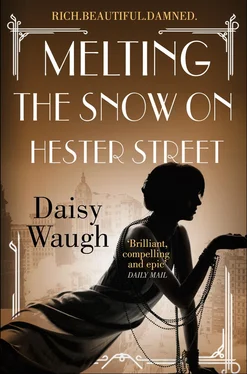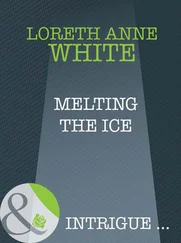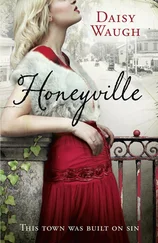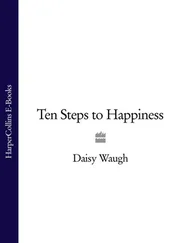It was all such a long time ago now. But the months and years rolled by – and he knew the affair rumbled on. Or he didn’t know. But he knew. Because Eleanor almost never mentioned Butch’s name, though they worked together; and because Eleanor lied so well, about everything, always, and because she seemed always to be wrapped in an invisible, impenetrable shell. Just as he was.
After his failed attempt to get through to Butch, Max had thrown down his telephone in disgust and immediately, blindly, stormed along the corridor to fight it out with his boss.
Silverman glanced up from his work as Max burst in. ‘Ha!’ he barked cheerfully. ‘Well, I was wondering when you’d finally show your handsome face in here. And before you even start, Max – listen to me. You’re gonna get used to him. Trust me. He’s good news for the studio. Which means he’s good news for you and he’s good news for me.’ And that was it.
When Max tried to present the case against Butch: that he was untrustworthy and extravagant; that his artistic taste was vacuous and shallow; that the sort of big budget films he produced were anathema to all that Silverman Pictures stood for, his employer and friend held up a hand to shush him. And when that didn’t work, and Max continued shouting, he stood up from behind his desk (something he didn’t do often) and simply pushed him from the room.
‘It’ll be good for us,’ was all Joel Silverman would say. ‘Don’t whine, Max. Men should never whine. Butch Menken’s the best producer in the business. He’s just the tonic we need. And if you cared about this studio as much you ought to, you’d be celebrating. Just as I am. Now go home, Max. Lighten up. Enjoy a pleasant weekend with your beautiful wife … And while you’re at it, would you thank her please for a beautiful party last night. Tell her Margaret wants to know where she found those lobster …’
Max returned to the Castillo not long afterwards. Feeling bruised and foolish, and in a filthy mood, he went directly to his study, where he stayed, hidden away, drinking heavily to dull the myriad of pains – among them the ache, ever present, in the palms of his two hands. It was always more acute when he was tired. He sat at his desk and pulled out the old screenplay, the one he turned to whenever his hands burned, or his heart ached, and which one day he swore he would make into a film. After several hours of failing to make any progress with it, he staggered to bed.
All the time he had imagined his wife’s brooding presence somewhere in the house, and was torn between resenting her failure to engage with him, and delighting in not being required to engage with her. But then the bedroom was empty. And then there it was, the miserable little note:
M,
I shall be gone for a few days. I think it’s about time we talked, don’t you?
E
He stared at it stupidly, mind throbbing, trying to work out what in hell it meant. Time to talk? About what? He was tempted to laugh.
Where did she imagine they could possibly begin?
The Nickelodeon on Hester Street
New York City, December 1909
Thick snow had settled above the city grime on Hester Street. During the day, the two had mingled under a million tired feet, and this evening the resulting soup had frozen over once again. Eleana’s boots had been restitched so often there was barely anything left to hold them together. They had sucked in the filthy, icy mire, numbed her feet as she stood on Greene Street – and now, in the steaming warmth of the picture house, they were itching and aching as they thawed. It didn’t matter. Not really. It was such a relief to be inside – somewhere warm and cheerful at last – and with Matz at the piano, smiling at her through the crowd. There was neat gin running warm through Eleana’s veins, and hot potato soup in her belly, and the new movie, Frankenstein , playing on a loop on the screen above her head. Her feet could have detached themselves completely and she might not have complained.
Maybe ‘picture house’ was too grand a name for the place. It was a five-cent Lower East Side nickelodeon, a dirty little store front, nothing more, and nothing like the big, fancy theatres opening further uptown. There was a screen at one end, a hand-turned projector at the other, and not enough benches for the boisterous audience between the two. It was packed, as it was every night, even now, with the garment strike – and thick with the smells of tobacco and sweat, and hot, unwashed bodies.
The projection screen was too small, or the film was too large. Something wasn’t right. As always, at the nickelodeon on Hester Street, the top half of the image was bouncing lopsided off the ceiling. But nobody complained. In the normal run of things, such a detail wouldn’t stop the audience from screaming with merry terror: it was Matz Beekman, up to his tricks at the piano keyboard, who was so blithely sabotaging the mood.
Matz was employed five evenings a week (at seventy-five cents a night) to provide musical accompaniment to whatever film was showing. Tonight he had cast aside the official score, as he did from time to time, and was improvising a comic soundtrack of his own – turning what was meant to be a horror show into a ludicrous romp – and the crowd was loving it. Their bellows of laughter could be heard outside on the frozen street, bursting from the room, beckoning more people to join the hot, boisterous crush. Looking at them all, as Eleana did just then, it would have been hard to guess just what and whom they were up against. The garment workers’ general strike, into its third week now, was more widespread – and more successful – than anyone had expected it would be, including the strike organizers. And now the city authorities were turning savage. In cahoots with the factory owners, they were letting their thugs loose on the picket lines, and for the mass of the Lower East Side, garment-manufacturing centre of the world, life had become not merely a struggle to stay warm and to find enough to eat, but a battle – bloody, violent, lawless. To the hunger and the grind, the anonymity and the squalor, there had been added a tang of actual, mortal fear.
Eleana turned her mind from it, from all of it. Everything to do with the strike, and everything connected with it. She concentrated instead on the here and now: the nickelodeon on Hester Street. And Matz at his piano. And Frankenstein and his monster, bouncing off the ceiling.
The film was only sixteen minutes long and Matz knew every frame. He watched movies differently from other people – with the same concentration and passion that he did everything, but with a filmmaker’s instinct, too; though he couldn’t know it yet. It meant he only needed to watch something once, and he could break it down, scene by scene, shot by shot.
No matter what the film was showing, in just a handful of notes, and simply to keep himself amused, Matz could take possession of it, transform the mood. He could send the audience lurching from horror to tears and then to laughter, and carry every soul in the room with him. It was magical. Matz was magical. Eleana loved him most when he was at the piano, hitting the keys, playing the audience – happy and free. He was a different man from the one who stood on stage at the Union halls and called on his fellow workers to strike, or to keep striking, or to keep up the fighting. She loved him then, too – of course. She loved and admired him in the halls. But she loved and desired him at the piano. He would look up suddenly, in the middle of it all, his audience weeping or laughing at his musical command – he would glance up through the crowd, with that look of ferocious concentration, search out Eleana, catch her eye, and his face would break into a wild grin. Often, more and more often, he would beckon her over, forget the film entirely, and instead start hammering out one of the popular songs, in the hope that she might sing along …
Читать дальше












